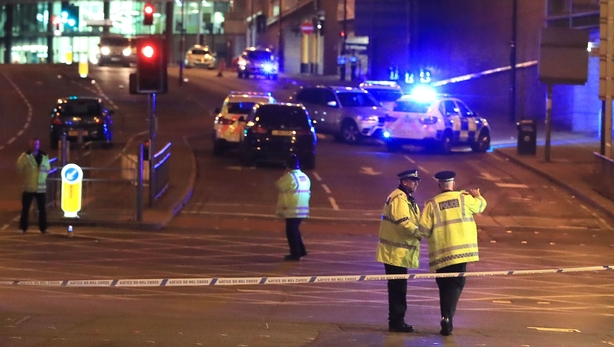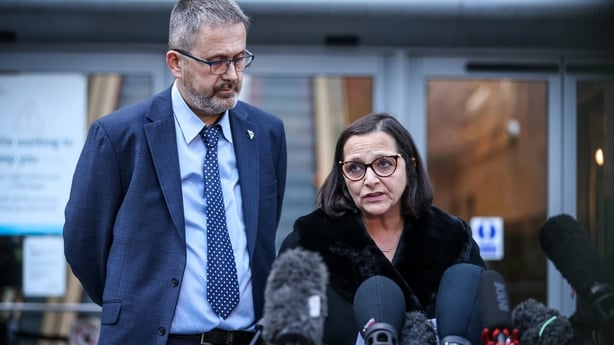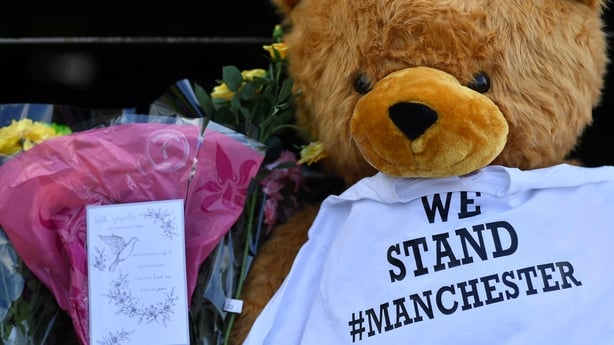Survivors who were among the closest people to suicide bomber Salman Abedi when he detonated a device at an Ariana Grande concert in Manchester five years ago have said they felt they were "left to die" by emergency services.
Manchester Arena Inquiry Chairperson John Saunders has delivered a scathing report on the response of emergency services, saying "significant aspects" went wrong.
Law firm Hudgell Solicitors is preparing civil claims for more than 150 survivors from the 2017 Manchester Arena attack.
They are seeking damages for physical and psychological injuries, to recover loss of earnings and cover the costs of ongoing treatment, rehabilitation and care.
Among its clients are sisters Janet Senior, 64, and Josie Howarth, 66, from Knottingley, West Yorkshire, who were waiting in the City Room foyer waiting for their nieces, Jenny, 19, and Jodie, 13, at the end of the Ariana Grande concert.
All survived despite Ms Howarth being left with two nuts lodged in her leg and Ms Senior having a large metal nut embedded in her neck after completely shattering her clavicle, with another burning and branding its shape on her arm.
Ms Senior said: "We were injured in the foyer for about an hour with no help coming at all and that time will forever haunt me.
"Josie was slipping in and out of consciousness and I was worried she was going to die. I felt so alone, so helpless, so afraid. We were left waiting for what seemed an eternity.
"People were dying around us. I can still hear the sounds of all the people around wailing in agony and calling desperately for help. Over time, that calling out faded and people stopped calling out.
"I can remember thinking, as more time passed, 'Nobody is coming for us. We're being left to die'.
"There were too many chiefs, not enough doers. There were some exceptionally brave people who were inside when it happened and who acted like true heroes. These were mainly ordinary people acting on human instinct to help others. 'Joe Public' did their job but the emergency services had too many chiefs running organised chaos.
"I can understand the reluctance to put people in danger and I guess it's human nature not to, but I fully believe it was the duty of those emergency and rescue services to go in and to try and save lives."

Retired police and counter-terrorism officer Andrea Bradbury, 58, from Ribble Valley, Lancashire, received only minimal physical injuries as she waited with a friend to collect their teenage daughters.
She said: "This was preventable, I have no doubt. It was a perfect storm of failures in terms of the security services, the event organisers and our policing and emergency services. They were unprepared and totally caught off guard. It was appalling.
"I knew immediately it had been a bomb.
"I called the on-call counter-terrorism officer within minutes of the explosion on my mobile to give them a clear picture of what had happened in there, from somebody with experience, to help them quickly assess the situation, and I gave two further updates.
"I made it clear that a massive emergency response was needed immediately, as I thought around 30 people had been killed by a single bomb but that there were no firearms involved.
"As I left the arena I saw emergency vehicles rushing to the area and I believed they were heading in - in numbers - to help people but that didn't turn out to be the case.
"People were left in the time of need. It was so wrong, especially when experienced officers who did go in were demanding assistance and firearms teams had secured the building.
"Out of everything I've seen and been through in my life, this is the one thing I can't put out of my mind. It was horrific, but what has always frustrated and angered me is that fact that it was preventable in the first place, and after it did happen, people were so badly let down by the police and the emergency services."

Ruth Murrell, 52, saw a friend killed while she and her daughter, Emily, feared they may die too as they waited for emergency services to arrive.
Mrs Murrell said it has not only left them both psychologically scarred for life but also their loved ones too.
She said her eldest daughter, Jessica, has also since suffered from "survivor's guilt" and needed counselling as she gave up her ticket for the concert to allow her younger sister Emily to be able to attend with a friend.
Her husband Dave also needed counselling and had to give up his job because he was afraid to leave his family alone.
Mrs Murrell said she had to leave her job working at a GP surgery while she underwent seven operations on her leg and dozens of sessions of therapy.
Emily, now 18, has had to learn to walk again after she lost 25% movement in her left foot.
Mrs Murrell said: "We were left in the foyer without any help at all. We just kept thinking that help would arrive. Everybody who was able to was ringing the emergency services and asking when they were coming. People were dying in front of your eyes and it was just awful.
"What happened on the night at Manchester Arena was a shambles, just shocking. We all know now that so many errors were made. We can't change the past, but we must ensure that lessons are learned and that the right changes are made in the future.
"The security has to be so much better, the preparation and planning to respond has to be better, and the organisation of our emergency services must not be hindered by red tape like they were. They are emergency and rescue services, and must be focused on doing just that.
"In terms of the rescue effort at Manchester Arena, after all that has been said I still believe they could and should have been in there helping us within minutes."
Manchester Arena Inquiry Chairperson John Saunders has delivered a scathing report on the response of emergency services.
He said "significant aspects" of the emergency response "went wrong", which "should not have happened" and led to serious and fatal consequences for those directly affected by the explosion.
Britain's Home Secretary Suella Braverman said on Twitter that she would "carefully consider" the inquiry report's recommendations.
"This report is a devastating reminder of the Manchester Arena attack and the horror of that night when 22 lives were lost, while countless others were changed forever," she said, adding that she is thinking of everyone affected.

Emergency chiefs apologise over 'inadequate' response
Police, fire and ambulance chiefs have offered profuse apologies after the report.
One of the 22 people murdered in the suicide attack would probably have survived but for the failures on the night, the report said, which made 149 recommendations in light of the public inquiry into the bombing.
Care worker John Atkinson, 28, was six metres away when the explosion went off.
A member of the public used his wife's belt as a tourniquet on Mr Atkinson's leg as he lay bleeding in agony on the City Room floor for up to 50 minutes, during which time he told a police officer: "I'm gonna die."
Mr Atkinson's family said, "It is crystal clear that due to those failings, John died from injuries that he could and should have survived.
"John must have known that he was dying and the pain that causes us is too great to put into words.
"This should simply never have been allowed to happen."
Hours after Inquiry chairman John Saunders delivered his critical report, four chief officers in Greater Manchester from the police, fire, British Transport Police and the ambulance services, sat grim-faced at a press conference, some speaking of the personal "shame" they felt.
The report concluded: "Significant aspects of the emergency response on 22 May 2017 went wrong. This should not have happened.
"Some of what went wrong had serious and, in the case of John Atkinson, fatal consequences for those directly affected by the explosion."
Mr Saunders said it was "highly unlikely" that the bombing's youngest victim, eight-year-old Saffie-Rose Roussos, would have survived her injuries with "only a remote possibility she could have survived with different treatment and care".
Failures highlighted in the report included:
- Only three paramedics entered the City Room on the night to treat the dying and injured
- The initial command of the incident was taken by Greater Manchester Police's (GMP) force duty officer, Inspector Dale Sexton, who quickly became overwhelmed by the number of tasks in hand.
- Insp Sexton failed to tell other emergency services he had declared Operation Plato - a pre-arranged plan for a suspected marauding terrorist
- No common rendezvous point for 999 services was established
- Fire crews took more than two hours to even attend the incident after station manager Andy Berry chose to mobilise resources three miles from the Arena amid fears over safety.
- Evacuation of casualties failed, with 36 people still waiting to be taken from the City Room past midnight.
By 10.50pm, the City Room was a "cold zone" said Mr Saunders, where it was assessed there was no immediate threat to life from an armed terrorist - but neither paramedics nor firefighters were deployed en masse to the City Room amid confusion over whether an armed terrorist was still on the loose.
Instead, ambulances lined up outside the venue and firefighters mustered at a fire station three miles away.
Stephen Watson, chief constable of Greater Manchester Police, said, "Our actions were substantially inadequate and fell short of what the public have every right to expect, and for this, I apologise unreservedly.
"There's a combination of real sadness, real disappointment.
"An element of being ashamed that we did not do what we set out to do, but also a genuine determination that this never happens again."
The Chief Constable of British Transport Police, Lucy D'Orsi, said their "preparation and planning was inadequate", and she was "truly sorry" to all those affected.
Greater Manchester Fire and Rescue Service's Chief Fire Officer, Dave Russel, appeared to become emotional as he said the service's response to the bombing will "forever be a matter of deep regret for our service".
He added: "I do feel sadness and I do feel ashamed.
Daren Mochrie, chief executive of North West Ambulance Service said: "On occasions like this, the word sorry has the risk of sounding hollow. Nevertheless, I want to make it clear that while our actions were well-intentioned, we apologise wholeheartedly for our failures."
Mr Saunders' first report on security issues at the Arena was issued last June and highlighted a string of "missed opportunities" to identify Abedi as a threat before he walked across the City Room and detonated his shrapnel-laden device.
The third and final report will focus on the radicalisation of Abedi and what the intelligence services and counter-terrorism police knew, and if they could have prevented the attack. It will be published at a later date.

